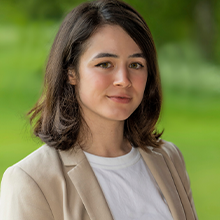Meet 2023 Infection Science Awardee Amber Barton

What are your current research interests?
I’m currently based at the Wellcome Sanger Institute, integrating pathogen genomics with epidemiological data to learn more about transmission of enteric infections and neglected tropical diseases. A lot of my work involves clinical samples, so integrating datasets through meta-analysis, modelling or multi-omics can provide a great opportunity to squeeze as much biological insight as we can out of the samples we have.
What is the theme of your talk?
My talk will be discussing previous work carried out at the London School of Hygiene and Tropical Medicine, UK, looking at how tear samples change over time during eye infections with Chlamydia. As tear samples don’t involve any needles or biopsies, this makes collecting samples from the same person over time much easier. This in turn allows us to see how host responses to infection evolve with time and in repeated infections.
How would you explain your research to a GCSE student?
Can you think of a time when you were sick but everyone else around you was fine? I’m really interested in what determines this! To some extent, it depends on your behaviour- one person might travel more, another might be less careful about drinking clean water. But even when people are all exposed to the same bacterium, not all of them will become ill. This depends on a number of things- you could have antibodies from a related infection, or a naturally strong immune system, or a microbiome that protects from invaders. To make matters even more complicated, small genetic variations in the bacterium you’re exposed to can also have a major impact.
If you could do any other job, what would it be?
I previously worked as a children’s science presenter and spent many years in a volunteer role creating inclusive sports and drama sessions, so science communication would be fun. I have to say I do also love the satisfaction that comes with cleaning up and visualising a messy dataset, which lends itself better to data science. I’m very grateful to be in research where I get to do a bit of both- analysing data and then talking to people about it!
Why is it important for the infection science community to engage with the Microbiology Society?
Clinical research is important for finding out what changes in human infectious disease, but engagement with microbiology is needed to answer why these changes happen.
